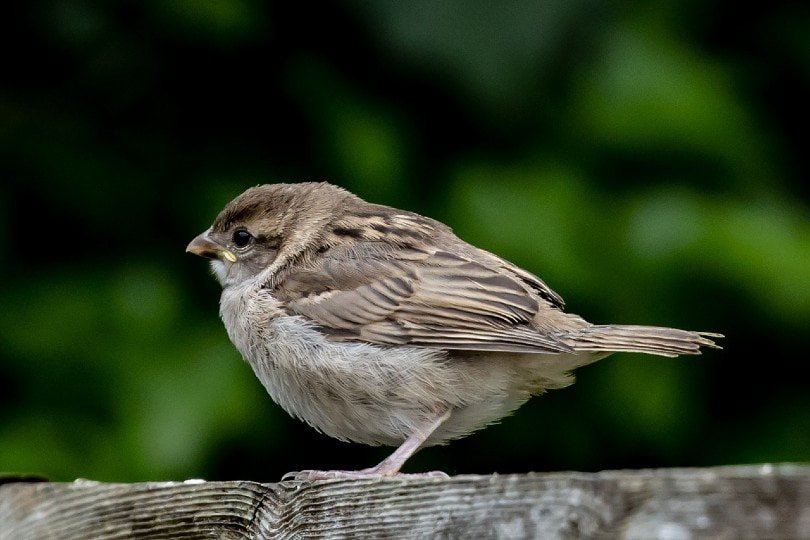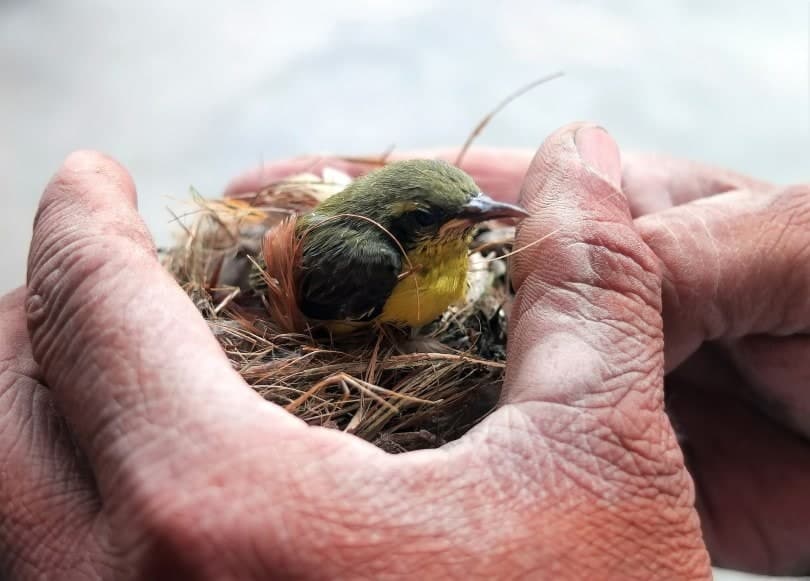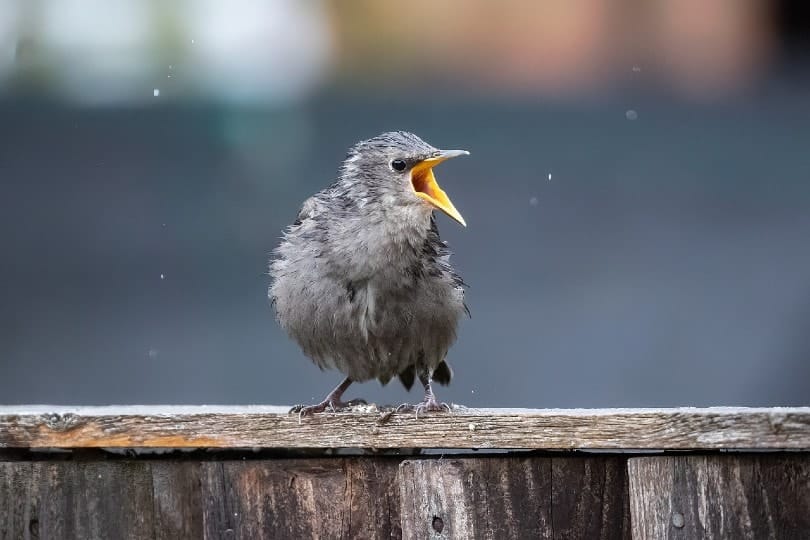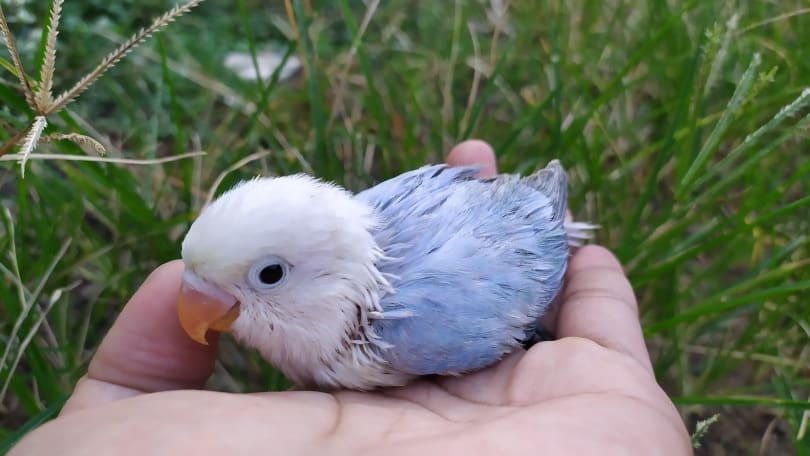There are many things that can leave a baby bird without its mother. Sometimes, domestic animals, like cats and dogs, can catch the mother and kill her. Other times, another problem could have led to the death of the mother bird.
Occasionally, the mother bird will simply not return to watch the babies. This is extremely rare, though. Birds do not have a good sense of smell, so baby birds will not be abandoned simply because you touched them. Other times, you may find yourself with a baby bird and be unsure where it came from.
In these circumstances, you may need to care for the baby yourself for a time until a rescue can be contacted. This article will provide some guidance on this.

Baby Bird Facts
There are hundreds of different kinds of baby birds. Luckily, many of them have the same basic needs. You can care for many baby birds for a short time without taking their particular species into account. If you’re unsure what species the baby is, there is no need to fret.
It is important to ensure that the baby bird is actually in need of your help before you step in. Many people may attempt to “rescue” a baby bird when it really isn’t abandoned at all. There are many situations where the baby may look abandoned, but the mother is often a short distance away.
For instance, many types of birds go through a short phase when they hop around on the ground. The babies will still be obviously small and unable to fly. They will be fully feathered and mobile, though. The mother still takes care of them at this point, but they are learning the ends and outs of survival. Baby birds at this point are strengthening their wings and learning how to catch food.
Occasionally, baby birds may leave the nest a bit earlier than they should. This may be due to a predator getting too close or even a person peering in the nest. Many babies will decide that their chances are better flying out of the nest than it is for them to lay there and potentially get eaten. However, the mother will still care for them and can usually be seen calling them and flying nearby. They are not abandoned.
Baby birds will not be abandoned if you touch them, as birds can’t smell very well. Therefore, if you can locate the nest and put them back in, this is usually the best option. In cases where the nest is destroyed, you can secure a basket into the tree and place the babies inside. As long as it is the same tree, the mother bird will typically follow the baby’s cries and find them.
- See also: How Much Does It Cost to Own a Bird?

Do Baby Birds Make Good Pets?
While it may be tempting to keep a baby bird as a pet, this is often illegal. Songbirds are protected under many laws, making it illegal to keep them as pets. This isn’t to prevent people from rescuing the babies. Instead, the laws are in place to prevent the capture of wild birds for the pet trade, which can lower their population in the wild.
You likely aren’t going to get in trouble if you have a baby bird—as long as you’re attempting to contact a rescue.
The problem with raising baby birds and then releasing them is that they will not have that learning period birds do in the wild. Most baby birds go through a period where they hop around on the ground, learning to fly and find food while still under their mother’s care. You cannot walk around and follow the baby bird outside for days on end. Therefore, it is very difficult to actually raise a baby bird that has the proper survival skills.
Wildlife rescues have the ability to do just this, however.

What Kind of Housing Does the Baby Bird Need?
You should place the baby bird into a small box lined with bedding, such as tissues, paper towels, or a similar material. Shoe boxes work very well for this purpose, but any sort of box will do. You should close the box loosely, ensuring that there is enough room for air to flow into the box.
You can keep the bird indoors in a quiet, safe location. Sometimes, placing the bird outside and in a safe spot can encourage the mother to find it. If the tree the nest was in is nearby, the mother may find the baby based on their sounds. Mother birds are extremely good at this. Many will take care of the baby bird directly in the box.
You should prioritize keeping the baby bird warm and dry.

What Should I Feed the Baby Bird?
Baby birds have a very specific diet. Feeding them the wrong thing can have serious consequences. The birds may choke, become malnourished, or develop intestinal problems. All of these things can quickly lead to the death of a baby bird. Most babies need live insects.
You should hold off on feeding the baby bird until you have contacted a wildlife rehabilitator. This person can let you know what and when you should feed the bird until the bird can be transferred to them.

How Do I Take Care of the Baby Bird?
You should aim to stress the bird as little as possible. Baby birds are very sensitive, and most abandoned birds have already gone through a bit of trauma. All the loud and unfamiliar noises can easily stress the poor bird, which can have a serious effect on their health. Plus, the lack of their mother is a serious problem.
You should aim to return the baby bird to their mother if at all possible. Of course, if you know the mother is dead, this will not be possible. Otherwise, a reunion is often possible. If you simply place the baby bird near where you found it, the mother will likely hear its cries and return. You can either follow the mother until you locate the nest or simply place the baby in a basket in a tree. If it is nearby, the mother will be able to hear it and will continue caring for the baby.
Baby birds do much better when they are raised by their mother.

How Do I Know if the Baby Bird Is Sick?
Occasionally, mother birds will kick babies out of their nest due to illness. This may seem heartless, but it prevents the other babies and mother from becoming sick. It is nearly impossible to tell if the baby is sick. Lethargy is a common symptom of practically any disease. However, baby birds that have fallen to the ground and gone without food for a few hours are bound to be lethargic even if they aren’t sick.
How Do I Prepare the Baby Bird to Live in Nature?
It is practically impossible for most humans to impart the survival skills a bird will need to thrive. You are not a bird, and therefore will have a hard time showing a bird how to survive as a bird. Rehabilitators are specially trained and have the equipment necessary to do this. They likely have room where the bird can roam safely in a natural environment while still receiving food. You likely do not have this sort of ability. Most people don’t have outdoor bird enclosures ready to be used.
Most birds raised in captivity will be unable to transfer into the wild. This is why a reunion with the mother is so important; it is often the only way for the bird to live a normal life.
Many released birds will simply keep returning to the place they were raised for food and water. They will likely not know how to survive bad weather or find food themselves.

Final Thoughts
You should only care for a wild baby bird for a short period of time. After that, you risk the chance of the bird imprinting on you, which will make the bird unable to survive in the wild. Often, your bird will need to be returned to the mother or taken to a rehabilitator that knows how to care for songbirds.
Featured Image Credit: fandy eka nanda, Shutterstock
